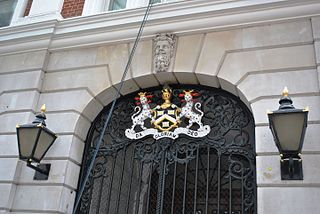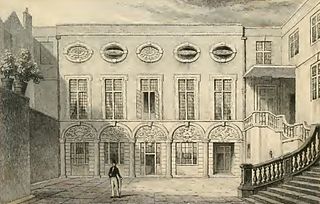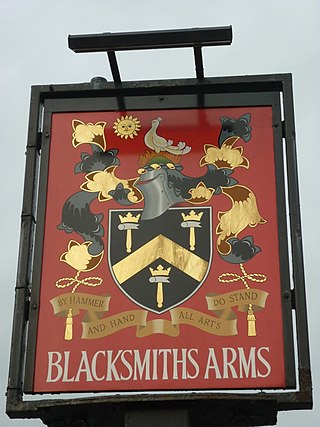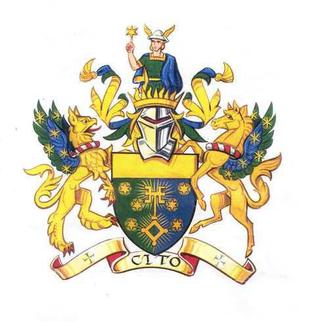
The Worshipful Company of Goldsmiths, commonly known as the Goldsmiths' Company and formally titled The Wardens and Commonalty of the Mystery of Goldsmiths of the City of London, is one of the Great Twelve Livery Companies of the City of London. The company's headquarters are at Goldsmiths' Hall, London EC2.

The Worshipful Company of Vintners is one of the oldest Livery Companies of the City of London, England, thought to date back to the 12th century. It is one of the "Great Twelve" livery companies of London, and its motto is Vinum Exhilarat Animum, Latin for "Wine Cheers the Spirit". One of the more peculiar rights of the Company involves the ceremony of swan upping.

The Worshipful Company of Dyers is one of the Livery Companies of the City of London. The Dyers' Guild existed in the twelfth century; it received a Royal Charter in 1471. It originated as a trade association for members of the dyeing industry but is now mainly a charitable institution. Each year the company participates in the ceremony of Swan Upping along the River Thames.

The Worshipful Company of Ironmongers is one of the Great Twelve livery companies of the City of London, incorporated under a Royal Charter in 1463.

The Worshipful Company of Clothworkers was incorporated by Royal Charter in 1528, formed by the amalgamation of its two predecessor companies, the Fullers and the Shearmen. It succeeded to the position of the Shearmen's Company and thus ranks twelfth in the order of precedence of Livery Companies of the City of London.

The Worshipful Company of Cutlers is one of the ancient Livery Companies of the City of London. It ranks 18th in the order of precedence of the Companies.

The Worshipful Company of Pewterers is one of the 110 Livery Companies of the City of London. It ranks 16th in the order of precedence of City Livery Companies and has existed since at least 1348. Like all the other City Livery Companies, the Worshipful Company of Pewterers has four main pillars of activity: Charitable endeavour, assistance to education, support for its trade and profession, and being a convivial and caring social community.

The Worshipful Company of Brewers is one of the livery companies of the City of London. London brewers are known to have organised as a group in the 13th century. Their first royal charter was granted by Henry VI in 1438. In 1643, Parliament imposed excise taxes on beer, ale, and malt, steadily increasing them until gin became cheaper, causing the growth of unlicensed breweries and, in 1685, James II extended the company's jurisdiction to eight miles around London and its suburbs. In 1739 it adopted new by-laws, which included the requirement for members to "enter into a bond [...] with the company against any expenses of their being elected to the office of sheriff or lord mayor". The company started to go into decline about 1750.

The Worshipful Company of Armourers and Brasiers is one of the livery companies of the City of London. The Armourers' Guild was established in 1322; it received a royal charter in 1453. Other companies, including the Armour Repairers, merged with the Armourers. In 1708, brass workers joined the company, which was renamed as the Armourers' and Brasiers' Company. The company does support the metallurgy industry, but does not retain a close association with its original trade, as is the case with a majority of livery companies. It exists primarily as a charitable establishment.

The Worshipful Company of Tallow Chandlers is one of the ancient livery companies of the City of London. The organisation, which engaged not only in tallow candle making but also in the trade of oils, first received a Royal Charter in 1462.

The Worshipful Company of Girdlers is one of the Livery Companies of the City of London.

The Worshipful Company of Cordwainers is one of the Livery Companies of the City of London. Cordwainers were workers in fine leather; the Company gets its name from "cordwain" (cordovan), the white leather produced from goatskin in Cordova, Spain. All fine leather makers, including Girdlers and Glovers, were originally classified as cordwainers; however, the term eventually came to refer only to fine leather footwear, including boots.

The Worshipful Company of Carpenters is a livery company of the City of London. The Carpenters were traditionally different from a fellow wood-crafting company, the Worshipful Company of Joiners and Ceilers, in that carpenters utilised nails while joiners used adhesives to attach wood.

The Worshipful Company of Painter-Stainers is one of the livery companies of the City of London. An organisation of painters of metals and wood is known to have existed as early as 1283. A similar organisation of stainers, who generally worked on staining cloth for decorative wall hangings, existed as early as 1400. The two bodies merged in 1502; the new organisation was incorporated under a Royal Charter in 1581.

The Worshipful Company of Innholders is one of the 111 livery companies of the City of London.

The Worshipful Company of Founders is one of the Livery Companies of the City of London, England. The Founders, or workers in brass and bronze, were incorporated under a Royal Charter in 1614. However, with the development of technology, the ancient craft grew obsolete. Now, the Company exists, along with a majority of Livery Companies, as a charitable foundation. It also supports the foundry industry by awarding research grants and scholarships.

The Worshipful Company of Coopers is one of the Livery Companies of the City of London. The organisation of coopers existed in 1422; the company received its first Royal Charter of incorporation in 1501. The cooper trade involved the making of wine, beer, and spirit casks ; the Livery Company also functions as a charitable foundation, and supports two education establishments: the Coopers' Company and Coborn School of Upminster, Essex, and Strode's College of Egham, Surrey. The former was founded in the Ratcliffe area of London in 1536 and donated to the Company who have been involved with it ever since.

The Worshipful Company of Blacksmiths is one of the livery companies of the City of London. The organisation was first mentioned in a court record in 1299. A Royal Charter officially granting it the status of Company was granted in 1571. The Company originally had the right to set regulations and standards for blacksmiths in the City of London. However, the right eroded over time. By the end of the eighteenth century, little remained of the company's former powers and so the Company did not the renew the lease on its hall at expiration in 1785.

Goldsmiths' Hall is a Grade I listed building at the junction of Foster Lane and Gresham Street in the City of London. It has served as an assay office and the headquarters of London's goldsmith guild, the Worshipful Company of Goldsmiths, one of the livery companies of the City of London. The company has been based at this location since 1339, the present building being their third hall on the site.






















